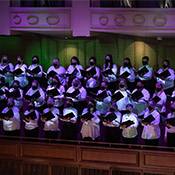
Dashon Burton is Elijah
David Lewellen
PUBLISHED
Tagged Under: 2022.23 Season, Classics, Guest Artist
Dashon Burton will be front and center with the Milwaukee Symphony this month, singing the title role in Mendelssohn’s oratorio Elijah. But in conversation, he’s more interested in talking about the totality of the work.
“The most important piece of Elijah is the chorus,” he said recently by phone from Manhattan, during a rehearsal break with the New York Philharmonic. “They’re the engine of the emotional expression and the fire. They breathe life into every moment of the piece for me. It’s some of the best choral writing in all of classical music.”
The piece tells the story of the ancient Israelite prophet Elijah, with the chorus acting as both a character in the drama and a commentator on the action. “Elijah and I are old friends,” Burton said. “I’ve sung it many times.” But he looks forward to working for the first time with MSO Music Director Ken-David Masur, which will represent its own tie to the work’s history. Mendelssohn and Masur’s father, Kurt, were both directors of the Leipzig Gewandhaus Orchestra, roughly 150 years apart.
Burton has carved out a wide-ranging career for himself in early music, new music, and repertory staples such as Elijah. “I want to do as many things as possible,” he said. “There’s nothing like the process of bringing a brand-new work to life – but there’s also nothing like performing one of these genius pieces.”
He is an original member of the groundbreaking vocal ensemble Roomful of Teeth, known for commissioning and performing works that push the boundaries of singing. “That’s a completely different experience,” he said, “We collaborate with the creativity of the human voice, finding interesting sounds.” Working directly with composers, he said, is “a unique process in vocal music.”
But he tries not to think much about the differences between solo and ensemble work. “I want to adapt to any situation that I’m in,” he said.
Reviewing a song recital in the San Francisco Chronicle in 2019, critic Joshua Kosman praised Burton’s choice of material, as well as his “wondrous musical gifts — his robust, sinewy vocal tone, probing interpretive mastery and charismatic communicative directness.”
Taking care of a professional singing voice is “basically the same as care and feeding for your body, mind, and spirit,” Burton said. “Stay hydrated, get plenty of rest, be committed. Being bored is no way to go through life. If you just go through the motions, your voice will get burned out like your mind does.”
Mendelssohn was German by birth, but Elijah had its world premiere in England and has always co-existed in English and German versions. The MSO’s performances will be in German with English supertitles, but Burton said, “I always try to make it as inviting as possible. Classical music has such a tradition of exclusion, and we have to try to break that down every time we perform.” Even in a language the audience doesn’t speak, Burton works to convey the drama of the piece. “It’s important that the walls are down emotionally and that it’s not esoteric.”
Ensuring inclusion took on new urgency for the classical world after widespread unrest in the summer of 2020. For many organizations, the commitment to seek out composers, performers, and audiences of other races has hung on after the headlines faded. “Organizations have to continue to keep the promises they made,” Burton said. “I have to tell the story of what it is to be a person of color in this country. If you’re not seeing the urgency, you’re looking in the wrong places.”



